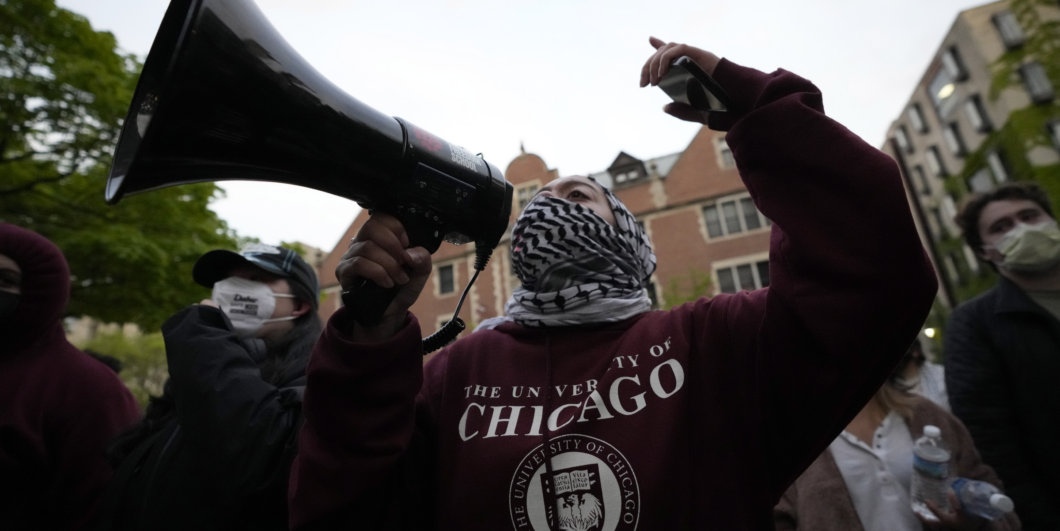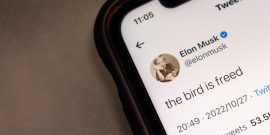Will Chicago Stand by Its Principles?
The University of Chicago, from which I received my graduate degrees, has long constituted America’s model of a temple of learning, dedicated to freedom of inquiry, unconstrained either by political considerations or narrow financial ones. Under its legendary president Robert Maynard Hutchins, the school abolished its top-tier football team, based on Hutchins’s belief that high-powered sports had no connection to the university’s educational mission. In the late 1940s and early 1950s, Hutchins defended the right of the University’s faculty to teach as they wished, arguing that the best way to defeat communism was through open debate and scrutiny, rather than suppression. (He even allowed an official of the American Communist Party to give an address on campus.)
When the threat to academic integrity at the university came from the opposite end of the political spectrum, during the anti-Vietnam War student protests of the late 1960s, Hutchins’s successor as president, former law dean Edward Levi, was no less stalwart in defending the university’s educational mission against political pressures. When student demonstrators occupied the administration building where his office was located, Levi didn’t call on police to remove them. But neither did he surrender to the demonstrators. Instead, he simply waited them out. After more than two weeks had passed, when the protestors finally tired of the occupation (not having been as well supplied with comestibles as today’s pro-Hamas demonstrators) and filed out of the building, Levi had campus police take down their names. Afterward, he ordered the suspension or dismissal of many of their leaders. In the process, Levi took no position on the rightness of the war. For him as for Hutchins, and for most of the university’s dedicated faculty, it was simply that political passions, however deeply felt, could not be allowed to interfere with the unbiased pursuit of knowledge.
The University earned further plaudits for that commitment during the heyday of “political correctness” on college campuses around the nation starting a decade and more ago, after students at various schools sought to block the selection of commencement speakers whose political views they disagreed with, and partisans also began shouting down guest speakers and demanding that course syllabi be altered to conform to ideological demands. In response, the university’s president, Robert J. Zimmer, and Provost Eric D. Isaacs organized a Committee on Freedom of Expression, authorizing it to draft a statement articulating Chicago’s “overarching commitment to free, robust, and uninhibited debate and deliberation among all members of the University’s community.” Citing several previous University presidents, including Hutchins and Levi, the report stressed that the university’s commitment to maintaining a climate of civility and respect could not be used to prevent the “discussion of ideas,” even if “some or even most members of the University” found them “disagreeable,” “offensive, unwise, immoral, or wrong-headed.” The report identified the school’s twofold responsibility as being to “promote a lively and fearless freedom of debate and deliberation, but also protect that freedom when others attempt to restrict it.”
Once the university’s dean of students, acting in accordance with what came to be known as the Chicago Principles, sent a letter in 2016 to that year’s entering freshman class, restating the university’s free speech principles and renouncing any use of “trigger warnings” or “safe spaces” to prevent students from being exposed to thoughts, statements, or writings that might offend them, the Principles gained widespread support nationwide. As of 2022, the Foundation for Individual Rights in Education reported that 84 US colleges and universities had “adopted or endorsed the Chicago Statement or a substantially similar statement.” That number has undoubtedly grown, subsequently.
What the occasion called for was not merely a defense of the principle of “institutional neutrality,” but a ringing announcement of why universities need to remain neutral in political disputes: to continue their devotion to the open-minded pursuit of truth.
Now, however, under the pressure of the increasingly violent pro-Hamas demonstrations that have swept American campuses in recent weeks, it appears that the University’s current president, Paul Alivisatos, has begun to retreat a bit from his predecessors’ noble legacy. In a column in the May 8 Wall Street Journal, Alivisatos explained why he had decided to break up a tent encampment that had occupied the school’s main quad for over a week: having initially “authorized discussions with the protesters … in response to some of their demands,” he “concluded that those demands were incompatible” with the university’s “deep principles,” and hence ended the encampment. (The protestors demanded that the university “take sides” on the Gaza conflict, as well as seeking to dictate everything from the investment of the university’s endowment to what public statements the president is allowed to make. Additionally, as newspaper reports indicated, the students, under the banner “Popular University for Gaza,” insisted that the university allocate “more money … to education and housing” in its neighborhood, as if that were a proper use of (already high) tuition dollars—and as if the students had any right to impose such demands. While lamenting the reported deaths toll in Gaza, their banners made no mention of the heinous, unprovoked attack on Israelis that had necessitated Israel’s war to eliminate the terrorist group.)
But while Alivisatos justified “dialogue” with protesters so long as they understand “that the consequences of their policy violations will be reviewed evenhandedly,” including possible “discipline,” he did not announce the issuance of any punishment for their violation of university rules, such as President Levi had imposed. And in his column, he went so far as to justify his delay in shutting down the encampment by describing “discord”—by which he did not mean mere disagreement—as “almost required” for a university’s “truth-seeking mission.” Hence, while purporting to uphold the Chicago Principles, he praised physical protest “as a mechanism for democratic societies, and places of reason like universities, to find a way back toward dialogue and compromise.” “This has value,” he maintained, “even if protests result in disruption or violate the rules of the university,” so long as they don’t “substantially interfer[e]” with the university’s “learning, research, and operations” or “meaningfully diminish[h]” others’ free-expression rights, as the Chicago encampment ultimately did. But he offered no criteria for ascertaining what interferences or violations of others’ rights are “substantial” enough to justify clamping down. (How about disrupting entire classes, as advocates of DEI have done at many schools, so as to compel others to acknowledge your point of view?)
As university administrations go, the way that President Alivisatos conducted himself compares favorably with that of many other university officials—at schools including Northwestern, Brown, and Rutgers—who have made shameful concessions, under threat, to Hamas activists. Alivisatos rightly remarked that a university that succumbed to demands that it take partisan stances on issues that were of no relevance to its educational mission “would no longer be much of a university.”
Still, Alivisatos’s concessions regarding the acceptability and even the value of disruptive protests and violations of university rules have an air of wishy-washiness that I cannot imagine Presidents Hutchins or Levi to have exhibited. What the occasion called for was not merely a defense of the principle of “institutional neutrality,” but a ringing announcement of why universities need to remain neutral in political disputes: to continue their devotion to the open-minded pursuit of truth by means of reason, not to accommodate whatever partisan prejudices seem to dominate campus activists or the broader community at any given time. Such a statement would also have reminded his fellow citizens outside the university of the inherent value of the rule of law, a prerequisite of free government.
Alumni and admirers of the University of Chicago had a right to demand more from its president.

